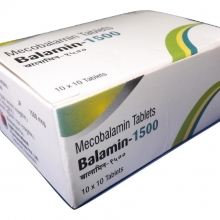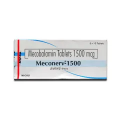Home / Categories / BALAMIN-1500MG

BALAMIN-1500MG
(10X10)
MECOBALAMINE(B12)-1500MG
VITAMIN AND MINERALS
APPLE INTERNATIONAL PHARMACEUTICALS P. LTD.
Product Details
| Cyanocobalamin (Vitamin B12) |
| (sigh-an-oh-koe-BAL-uh-min) |
| Big Shot B-12 |
| Tablets: 5000 mcg |
| Crystamine Injection: 1000 mcg/mL |
| Crysti 1000 Injection: 1000 mcg/mL |
| Cyanoject Injection: 1000 mcg/mL |
| Cyomin Injection: 1000 mcg/mL |
| Nascobal Gel, intranasal: 500 mcg/0.1 mL |
| Rubesol-1000 Injection: 1000 mcg/mL |
| Rubramin |
| Class: Blood modifier, Vitamin |
 Action Involved in protein synthesis; essential to growth, cell reproduction, hematopoiesis, and nucleoprotein and myelin synthesis.
Action Involved in protein synthesis; essential to growth, cell reproduction, hematopoiesis, and nucleoprotein and myelin synthesis.
 Indications Treatment of vitamin B12 deficiency caused by inadequate utilization of vitamin B12; dietary deficiency of vitamin B12 occurring in strict vegetarians; malabsorption syndrome of various causes (eg, pernicious anemia, GI pathology, fish tapeworm infestation, malignancy of pancreas or bowel, gluten enteropathy, small bowel bacterial overgrowth, gastrectomy, accompanying folic acid deficiency); supplementation because of increased requirements (eg, associated with pregnancy, thyrotoxicosis, hemolytic anemia, hemorrhage, malignancy, hepatic and renal disease); vitamin B12 absorption test (eg, Schilling test).
Indications Treatment of vitamin B12 deficiency caused by inadequate utilization of vitamin B12; dietary deficiency of vitamin B12 occurring in strict vegetarians; malabsorption syndrome of various causes (eg, pernicious anemia, GI pathology, fish tapeworm infestation, malignancy of pancreas or bowel, gluten enteropathy, small bowel bacterial overgrowth, gastrectomy, accompanying folic acid deficiency); supplementation because of increased requirements (eg, associated with pregnancy, thyrotoxicosis, hemolytic anemia, hemorrhage, malignancy, hepatic and renal disease); vitamin B12 absorption test (eg, Schilling test).
 Contraindications Hypersensitivity to cobalt, vitamin B12, or any component of these medications; hereditary optic nerve atrophy.
Contraindications Hypersensitivity to cobalt, vitamin B12, or any component of these medications; hereditary optic nerve atrophy.
Recommended Dietary Allowance
Adults: PO 2 mcg/day. Children: PO 0.3 to 2 mcg/day.
Vitamin B12 Deficiency
Adults: PO 25 to 1000 mcg/day.
IM or deep SC 30 mcg/day for 5 to 10 days followed by 100 to 200 mcg/mo.
Intranasal 500 mcg once weekly after malabsorption is in remission following injectable therapy.
Addisonian Pernicious Anemia
Adults: IM or deep SC 100 mcg/day for 6 to 7 days. If reticulocyte response occurs, give 100 mcg qod for 7 doses, then give 100 mcg q 3 to 4 days for 2 to 3 wk. After this regimen, give 100 mcg/mo for life.
Shilling Test Flushing Dose
Adults IM 1000 mcg (z-tract method preferred).
Chloramphenicol: Decreases hematologic effects of vitamin B12 in patients with pernicious anemia. Colchicine, excessive alcohol intake (more than 2/wk) neomycin, time-released potassium, para-aminosalicylic acid: Decreases GI absorption of vitamin B12.
Methotrexate, pyrimethamine and most antibiotics: May invalidate vitamin B12 diagnostic microbiological blood assays.
With parenteral/intranasal administration:
CARDIOVASCULAR: Pulmonary edema; CHF; peripheral vascular thrombosis. DERMATOLOGIC: Itching; transitory exanthema; urticaria. EENT: Severe and rapid optic nerve atrophy. GI: Mild transient diarrhea. OTHER: Hypersensitivity; pain at injection site; sensation of body swelling; hypokalemia; polycythemia vera. Intranasal: Asthenia; headache; infection; glossitis; nausea; paresthesia; rhinitis.
Pregnancy: Category A (Category C in doses that exceed the RDA). Lactation: Excreted in breast milk. Children: Some products contain benzyl alcohol, which has been associated with fatal “gasping syndrome” in premature infants. Hypersensitivity: Anaphylactic shock and death have been associated with parenteral use. Hypokalemia: Possibly fatal hypokalemia could occur as result of increased erythrocyte potassium requirements in severe megaloblastic anemia intensely treated with vitamin B12.
| PATIENT CARE CONSIDERATIONS |
|
- If patient is sensitive to cobalamins, perform an intradermal skin test prior to administering drug.
- Give IM injection or deep SC injection in large muscle mass.
- Parenteral administration is required in treatment of pernicious anemia.
- Prime intranasal gel dispenser prior to initial use.
- Protect parenteral and intranasal vitamin B12 from light. Do not freeze.
- Obtain patient history, including drug history and any known allergies. Note any history of Leber disease or sensitivity to cobalt and vitamin B12.
- Obtain baseline reticulocyte counts, hematocrit, vitamin B12, iron and folic acid levels, and then repeat tests between 5th and 7th days of treatment.
- Obtain periodic hematology tests as long as patient is on therapy.
- Monitor serum potassium levels during the first 48 hr of treatment.
- Throughout treatment, monitor and report vision changes to health care provider.
- Report signs of hypersensitivity (eg, urticaria, redness, itching) and hypokalemia (eg, muscle weakness, heart irregularity) to health care provider.
- Instruct patient with pernicious anemia of need to continue therapy throughout lifetime.
- Advise patient to administer intranasal gel at least 1 hr before or 1 hr after ingestion of hot foods or liquids.
- Advise patient with nasal congestion, allergic rhinitis, or upper respiratory tract infections to defer treatment with intranasal gel until symptoms have subsided.
- Teach patient of need to maintain well-balanced diet. Remind patient of the following good sources of vitamin B12: seafood, egg yolks, organ meats, fortified breakfast cereals, meat, cheeses, milk, other dairy products.
- Advise patient that folic acid is not substitute for vitamin B12 but may be taken concurrently.
- Instruct vegetarians who do not use animal products of need for daily oral vitamin B12.
- Inform patient with pernicious anemia of need to have periodic GI evaluations.
- Instruct patient to report the following symptoms to health care provider: muscle weakness, shortness of breath, heart irregularity, vision disturbances.
Books@Ovid
Copyright © 2003 Facts and Comparisons
David S. Tatro
A to Z Drug Facts
Substitutes

 Route/Dosage
Route/Dosage Interactions
Interactions Lab Test Interferences
Lab Test Interferences Adverse Reactions
Adverse Reactions Precautions
Precautions Administration/Storage
Administration/Storage Assessment/Interventions
Assessment/Interventions Patient/Family Education
Patient/Family Education